|
Rating |
Image |
Products |
Score |
Price |
|---|---|---|---|---|
|
1 Best |
 |
General Hydroponics Fertilizer Set (Flora Grow, Bloom, Micro Combo) Editor’s Choice |
||
|
2 |
 |
|||
|
3 |
 |
|||
|
4 |
 |
|||
|
5 |
 |
5GallonBucketHydro-Hydroponic Nutrients for Lettuce Greens and Herbs |
Growing vegetables and other plants through a hydroponic system is economical. It allows you to save a lot of time, effort, and of course, water. However, just like growing plants in a typical garden soil, you will need the best hydroponic fertilizer to provide them with the grow nutrients they need.
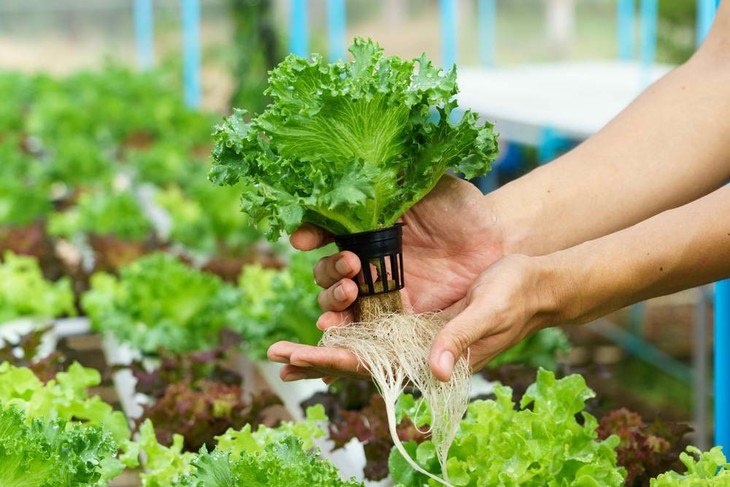
Vegetable cultivated through a hydroponics system
Hydroponic fertilizers are one of the most important purchases you need for growing your plants. The right nutrients in the right proportions will drastically affect the quality and quantity of your harvest. For a newbie grower, it’s quite challenging to use hydroponic nutrients for vegetables and any other crops since every component has to be water-soluble.
For this reason, we researched the best hydroponic fertilizer products and reviewed them for your own convenience. We’ve also included some important things you need to know about hydroponic nutrients along with a quick guide to choosing the right nutrients for your garden.
Why Use Hydroponic Fertilizers?
Fertilizers that are designed for soil have a different composition as compared to the ones for hydroponics because soil-based plants can easily get most of the required elements directly from the soil. With hydroponics, there is no soil for your plants to get elements from. For example, nitrogen is not readily available for plants in a hydroponic system since urea (which is the main source of nitrogen) is not water-soluble. Due to this, nitrogen should be delivered in its nitrate form for plants to absorb in a hydroponic environment.
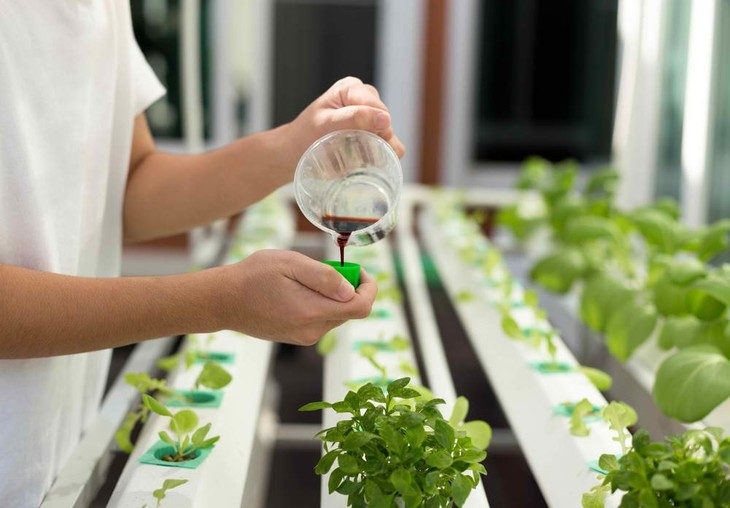
The liquid solution is applied to plants in a hydroponic environment to encourage growth
Do Hydroponically-grown Vegetables Taste Better?
You might have heard that crops grown through a hydroponic system have a bland flavor. If you plant the same crop naturally in an outdoor garden and hydroponically in an indoor garden, you might not notice any difference in their flavors at all. The only thing that could make a slight difference in their taste is the choice of fertilizer you use for growing them. However, you don’t have to worry – vegetables that are grown hydroponically won’t have the bland flavor as what others believe.
Which is Better: Liquid or Powdered Fertilizers?
Before we even tackle about the right way to choose a hydroponic fertilizer, you should first keep in mind that hydroponic fertilizers are available in two different forms: liquid and powder. If you’re a newbie grower, you might want to go for an easier option which is a liquid solution. Although it is a bit more expensive, it does help save your time and even effort! Meanwhile, commercial hydroponic growers tend to go for powdered forms since they produce bigger yields. The problem is, it will take a certain level of skill to master.
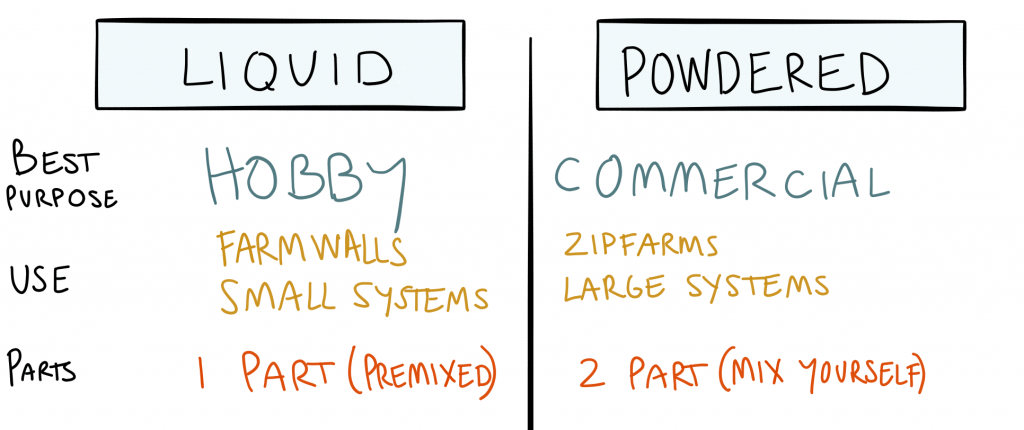
Liquid vs. Powdered Fertilizers. Via: university.upstartfarmers.com
Liquid Fertilizer
Liquid nutrients are commonly used by hobbyists for their hydroponic systems since they make the entire process quick and easy. Since they’re already premixed, there’s no longer a need to mix up a powder fertilizer and spend time in doing so.
Powered Fertilizer
On the other hand, powdered or dry hydroponic nutrients are commonly sold as a two-part powder mix. The first part consists of calcium nitrate while the second part contains the main nutrient mix. If you go for a powder mix, you need to mix the two powders in separate containers then combine them to form a solution. Most of these two-part powder mixes are complete solutions, although there are some that need another compound added as well.
Despite more complicated, powdered mixes are way affordable as compared to liquid solutions. Since the latter is mostly water, shipping them will require you to pay extra depending on how many volumes you’ve purchased.
Commercial hydroponics systems use powdered nutrients since they don’t have to pay for expensive shipping costs. Moreover, they can get mixes that are formulated specifically for weed, vegetables, strawberries, etc. (although this also applies for liquid fertilizers).
A Few Tips For Hydroponics Growers Who Use Nutrient Solutions For Fertilizer
If you’re more inclined to use a nutrient solution from one of the best hydroponic fertilizer products in our list, you need to know a few tips to help make your gardening experience as enjoyable and fruitful as possible. Some of them are as follows:
- To achieve the best results, check how hard your water is in PPM. Through this, you can easily manage the levels of acidity and alkalinity.
- If you’re going to use chlorinated tap water, make sure to reduce its chlorine content by leaving it to sit out for an entire day at room temperature.
- Metal might be a durable material to use for your hydroponic system. However, it could interact with your nutrient solution in an adverse manner. Use plastic for a safer choice instead.
- After a successful harvest, make sure to clean every part of your hydroponic system to ensure old nutrients don’t get mixed in with the new crops.
- Make sure to keep the temperature in check. Plants will be able to benefit more from your fertilizer if both the solution and water used are between 68 to 72 degrees Fahrenheit.
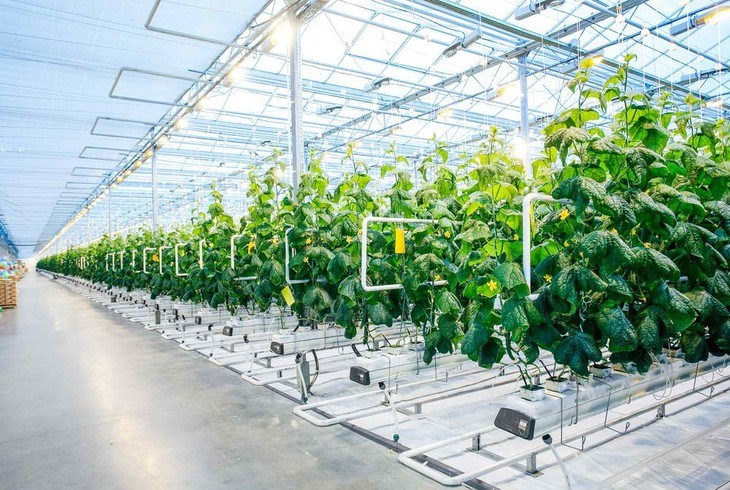
Maintaining the right temperature is ideal to create crops like these in a hydroponic environment
Factors To Consider When Buying Hydroponic Fertilizers
Choosing the best hydroponic fertilizer for your plants is one of the most important decisions you should make as a grower. But before you do so, you need to consider some important factors to help your plants achieve its maximum growth potential. Ultimately, it all comes down to the type of plants or crops you plan to grow, and to what size. To help you with that, here are some factors you have to keep in mind:
Nutrient management is the crux of a healthy hydroponic system.
1. EC Levels
EC levels or electrical conductivity is the number of nutrients your system currently have at a given point. Typically, you will need your EC level to be around 1200 to 1500 parts per million. By making sure your nutrients are in the ideal range, you will be able to produce healthy and robust plants.
2. Fertilizer Type
Like a non-hydroponic system, hydroponic systems also require the use of fertilizers. After all, this is where plants and crops can get the nutrients they need for proper growth. As mentioned earlier, there are two different types of fertilizers, and your choice of a fertilizer will depend on what and how you like your crops to grow.
For small areas such as a backyard, you might want to consider using liquid fertilizers. Since they are already premixed, you can easily use them without any problem at all! Meanwhile, if you have a large area, it is recommended to go for a powdered mix. Unlike liquid fertilizers, powder fertilizers are available in two parts. Before you can use them, you need to mix each part in separate containers and combine them together afterward before applying to your plants and crops.
Although powder fertilizers require a bit more skill to handle, they will help you save money as compared to liquid solutions.
3. pH Levels
pH level is yet another important factor you need to consider in order to maintain the health of your plants and crops. Depending on what you grow, you need to find out if your plants or crops will need more acidic or basic levels.
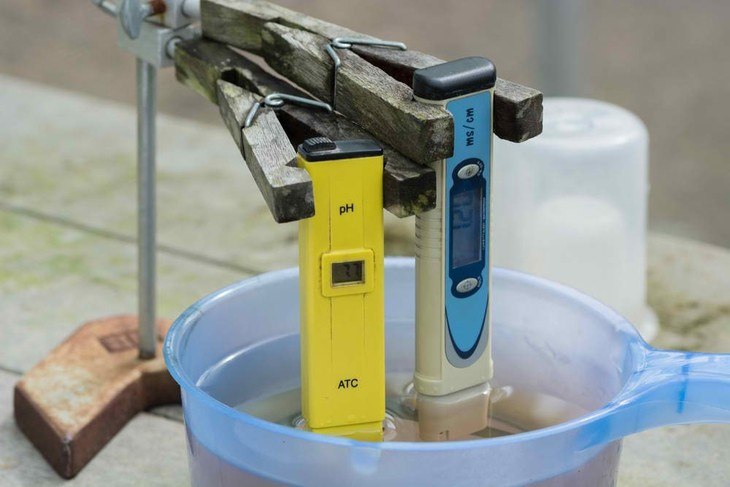
pH level is measured using a pH meter to ensure the right acidity or alkalinity levels
4. Organic or Synthetic
Organic fertilizers are the ideal choice for soil-based gardens since organic nutrients contain some elements that could clog up pumps and small tubes. Although some tests are being conducted to introduce organic fertilizers to hydroponics, a synthetic fertilizer is still considered the best option for now.
Synthetic nutrients are basically the most common nutrients used in hydroponics systems. One of the reasons is because they are easily broken down into smaller particles that can be easily absorbed by plants. However, it doesn’t necessarily mean they have more nutrients, just that they are absorbed more quickly.
5. Current Growth Stage
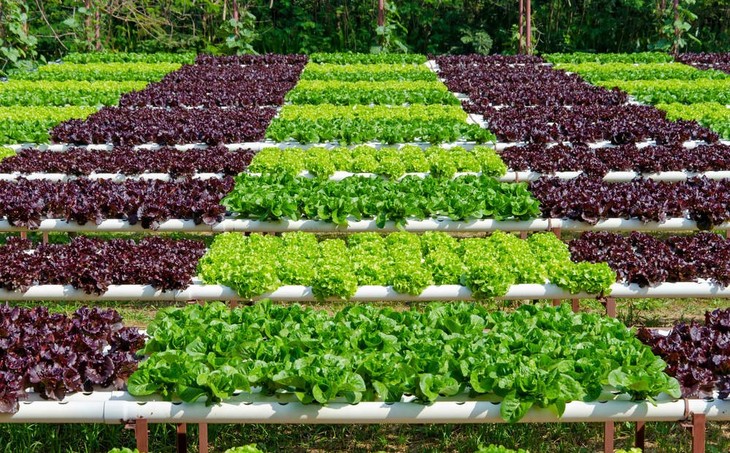
Vegetables during the vegetative stage in a hydroponic system
During a plant’s vegetative stage, it will require a lot of nitrogen to help it grow tall and leafy. Meanwhile, as it starts to enter flowering stage, you need to stop providing it with nitrogen and instead focus on providing more phosphorus and potassium, along with calcium and magnesium for producing bigger and more colorful flowers.
6. Your Budget
This one might be subjective, which is why you need to do some shopping and price comparison to find the best hydroponic fertilizer that could fit your budget. As long as your preferred fertilizer has all the nutrients you need, you won’t have to spend a lot of money on expensive products.
Dr. Nate Storey discusses the different hydroponic nutrients solutions on the market, what you should look for and the best solutions for your hydroponics system.
Top 5 Best Hydroponic Fertilizers In The Market
Without further ado, here are some of the best fertilizers we would like to recommend you:
#1 General Hydroponics Fertilizer Set (Flora Grow, Bloom, Micro Combo)

General Hydroponics Fertilizer Set (Flora Grow, Bloom, Micro Combo). Via: Amazon.com
This fertilizer set from General Hydroponics comes in a three-part nutrient system to help you customize your grow operation. The FloraMicro, which is your base nutrient, is a mixture of calcium, potassium, and nitrogen. It is used throughout the entire lifecycle of the plants. FloraBloom allows your crops to gain larger weight and size, not to mention it also makes the flowers grow large and colorful during the flowering stage. Meanwhile, FloraGro helps in building root structure and is used during the vegetative phase.
Pros
- The three-part nutrient system allows for complete customization for a more diverse medley of crops.
- This features a well-balanced pH system for ease of use.
- It is affordable, perfect for a grower on a budget.
Cons
- It comes with artificial colors.
- The product can possibly damage plants if used too much.
#2 Fox Farm-Liquid Concentrate Fertilizer (Big Bloom)

Fox Farm-Liquid Concentrate Fertilizer (Big Bloom). Via: Amazon.com
Fox Farm’s line of products is an excellent choice if you want your plants to grow larger, thicker, and greener. The Big Bloom fertilizer is part of Fox Farm’s trio along with Grow Big and Tiger Bloom. Big Bloom is used as the base fertilizer and should be used all throughout the entire cycle as a supplement for increasing your crop’s yield.
Pros
- It is incredibly helpful in healing root systems and keeping your plants fortified with nutrients.
- This helps in increasing essential oil production in your crops for stronger flavors.
- It cultivates plants in a very quick manner, usually around ten to eleven days.
Cons
- It can be quite acidic, thus requiring you to water it down using a basic solution.
#3 General Hydroponics-MaxiGro for Gardening

General Hydroponics-MaxiGro for Gardening. Via: Amazon.com
General Hydroponics is no doubt one of the leading producers of the best hydroponic fertilizer products in the market, and MaxiGro can attest to that. The best thing about MaxiGro is that aside from performing excellently in a hydroponic system, it also works well in soil-based gardening, allowing you to save money from buying a soil-based fertilizer. MaxiGro is used to help plants during the vegetative stage. It also helps in growing roots and establishing some base for strawberries, tomatoes, weed, and other vegetables.
Pros
- It can cultivate and grow crops in just a couple of weeks.
- It is very versatile and can be used on soil-based plants.
- It is an excellent choice for tomatoes.
Cons
- The product’s pH level drops quickly, forcing you to use a pH stabilizer.
#4 SEA-90-Organic Hydroponics Fertilizer, 5 Pound Bag

SEA-90-Organic Hydroponics Fertilizer, 5 Pound Bag. Via: Amazon.com
SEA-90 organic fertilizer is the result of the research conducted by Maynard Murray, a sea energy agriculture pioneer. It is made through solar dehydration of seawater from a particular sea, which houses one of the most diverse marine ecosystems. The nutrient is odor-free and water-soluble, making it perfect for use in a sprayer or spray bottles. With SEA-90, you can easily improve the health and growth of your crops.
Pros
- It is organic and 100% natural, making it safe for you and your family.
- This can be used in both hydroponics or soil-based gardens.
Cons
- This is a bit expensive as compared to the other products in this list.
#5 5GallonBucketHydro-Hydroponic Nutrients for Lettuce Greens and Herbs

5GallonBucketHydro-Hydroponic Nutrients for Lettuce Greens and Herbs. Via: Amazon.com
Most of the best hydroponic fertilizer products in the market are designed for a variety of plants and crops. Meanwhile, this brand is only designed for lettuce and other vegetables and herbs. But what’s the difference? Well, vegetables have a unique composition than other plants, which is why they will need a unique set of nutrients. By using this product for your veggies, you can notice explosive growth within a short period of time.
Pros
- This is specially formulated for explosive vegetable growth.
- It contains all necessary nutrients, both macro and micro.
- It’s not too strong to damage your plants even when you use more than recommended.
Cons
- You need to use it daily to achieve results.
Final Thoughts: So What’s The Best Hydroponic Fertilizer For Your System?
On my end, I would have to recommend MaxiGro for Gardening by General Hydroponics. Aside from being available in a water-soluble solution, which is quite easy to open and apply to your crops in a hydroponic environment, it is also an excellent choice for soil-based gardens. Moreover, it’s available for a very affordable price!
Hopefully, this post will help you look for the best hydroponic fertilizer for your system. Always remember to consider those important factors before you even make a purchase. If you want to know more about hydroponics gardening, you can check out our other related blogs. Also, don’t forget to share this article with your green thumb friends. Thanks for reading!
Pin it!
